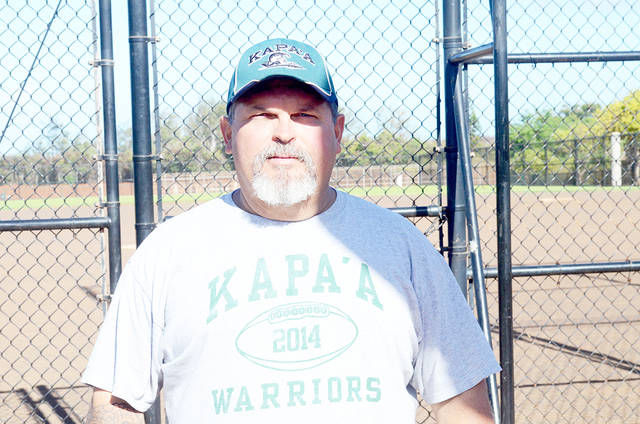KAPAA — Back in 1992, life was just starting for Philip Rapozo. Though just in his mid-20s at the time, he was already married with three young children and was working full-time at the Kauai Lagoons golf course. “And I
KAPAA — Back in 1992, life was just starting for Philip Rapozo.
Though just in his mid-20s at the time, he was already married with three young children and was working full-time at the Kauai Lagoons golf course.
“And I had my part-time business. My auto body, I was doing that part time,” Rapozo said. “I had my own house already. We owned our own house, me and my wife. Yeah, it was a trip.”
Hurricane Iniki struck 25 years ago but that day is still vivid in Rapozo’s memory.
He, as did the rest of the island’s residents, knew the hurricane was approaching. He wasn’t worried.
“I had been through one before that — Hurricane Iwa,” Rapozo said. “That was probably high school, I think. Ten years before that.”
“I wasn’t that worried. I was, ‘Ah. We’re just going to hunker down, and the thing’s going to go through. High winds, you know? It’s just going to be like the last one,’” he said. “But, brah, at one point I thought everybody was going to die. It was crazy.”
As the Category 4 hurricane blew its winds upward of 140 miles per hour, Rapozo and several other family members and friends locked themselves in the bathroom of his house for protection.
In a stroke of thought, Rapozo left all his windows open.
“I remember we were opening all our windows because somebody told us, ‘Let the windows open and let the wind go through the house. It won’t pop your roof off.’ We did that,” he said. “Every once in a while, we’d peek out. The wind was blowing through the house because we left all the jalousies open. But I think that’s what saved my house, you know?”
When winds calmed down, people started to make their way out of what was protecting them, thinking the worst was over.
It wasn’t. As the eye of the storm passed the island and winds picked back up, everyone again went into hiding.
“At one point, you can see the fear. My dad’s friend, he’s my dad’s age and he’s like an uncle to me. I could see it in his eyes that this is not good,” Rapozo said. “And then my friend’s wife was flipping out. Started crying. ‘We’re all going to die.’ Then the kids started crying. It got a little bit ugly, you know? A little bit scary. All you can do is pray and trust God’s going to save everybody.”
When the hurricane finally left Kauai, those fortunate to have survived embraced each other. Soon after, the would see what Iniki left behind.
“Oh, devastated, man. You’re just looking at your families. My dad, his two brothers, their houses were flattened. The tree houses in the front, there’s seven houses. The three on the valley, flattened,” he said. “My uncle has two houses on his property. The back one was flattened. The one in front was all right. It got damaged, but not too bad. And then the tree houses in the front, on the road, were in pretty good shape.”
Kauai then united and rebuilt itself.
“I think after going through something like that, it made the island unite. We felt like, of the island chain, we were the only one that got it bad. Oahu had some damage on the west side, I think, but nothing like (this). The whole island over here got it,” Rapozo said. “I think we got a chip, like our pride, you know? It brought the community close together, and everybody, I think, felt like we survived something like that and it was kind of amazing.”
Rapozo’s life, and those of the many others who survived the natural disaster, changed. Those changes are felt still to this day.
For one, at even the slightest chance of hurricane, he’ll not take chances.
“I extended my house since then. I’ll tell you what. I made them hurricane proof, you know what I mean?” he said.
Also, that part-time auto body business became full time. It was a good decision because months after, Kauai Lagoons laid off several workers, Rapozo said.
“That was 25 years ago, and I’m still in business. It worked out fine for me,” he said. “The hurricane had blessed my family, too. I made that decision. (If not), I’d probably still be working a regular job, you know? Just doing side work.”
He added: “I remember years after that, when the economy was bad, people were saying, ‘Oh, we need one more hurricane.’ I was like, ‘Brah. I’d rather starve than have one more hurricane.’ We’re lucky we lived. So when somebody would tell me that, I used to tell them, ‘Brah, go out and hustle. Why are you waiting for damage? We might not be lucky to be alive the next time.’”


